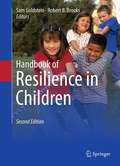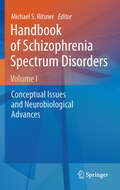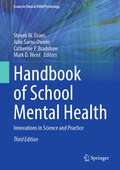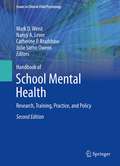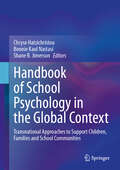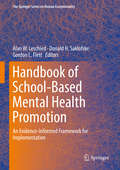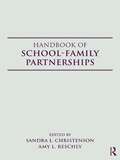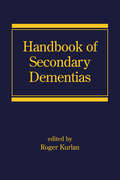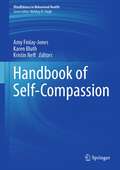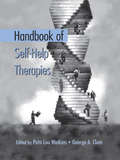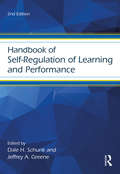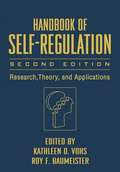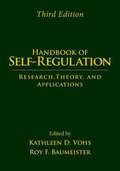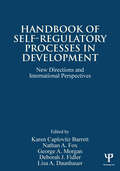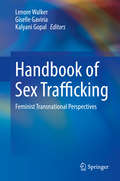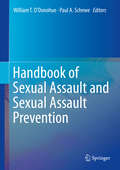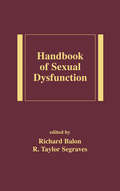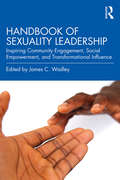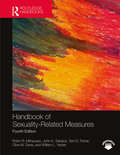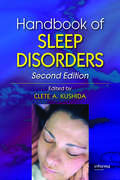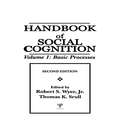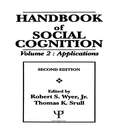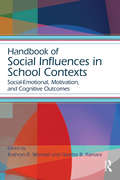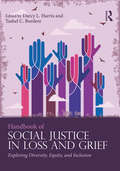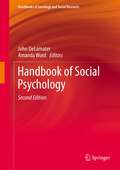- Table View
- List View
Handbook of Resilience in Children, 2nd Edition
by Sam Goldstein Robert B. BrooksToday's children face a multitude of pressures, from the everyday challenges of life to the increasing threats of poverty, exploitation, and trauma. Central to growing up successfully is learning to deal with stress, endure hardships, and thrive despite adversity. Resilience - the ability to cope with and overcome life's difficulties - is a quality that can potentially be nurtured in all young people.<P><P> The second edition of the Handbook of Resilience in Children updates and expands on its original focus of resilience in children who overcome adversity to include its development in those not considered at risk, leading to better outcomes for all children across the lifespan. Expert contributors examine resilience in relation to environmental stressors, as a phenomenon in child and adolescent disorders, and as a means toward positive adaptation into adulthood. New and revised chapters explore strategies for developing resilience in the family, the therapist's office, and the school as well as its nurturance in caregivers and teachers.<P> Topics addressed include:<P> Resilience in maltreated children and adults.<P> Resilience and self-control impairment.<P> Relational resilience in young and adolescent girls.<P> Asset-building as an essential component of treatment.<P> Assessment of social and emotional competencies related to resilience.<P> Building resilience through school bullying prevention programs.<P> Large-scale longitudinal studies on resilience.<P> The second edition of the Handbook of Resilience in Children is a must-have reference for researchers, clinicians, allied practitioners and professionals, and graduate students in school and clinical psychology, education, pediatrics, psychiatry, social work, school counseling, and public health.
Handbook of Schizophrenia Spectrum Disorders, Volume II
by Michael S. RitsnerA few disorders have some of the same symptoms as schizophrenia including schizoaffective disorders, schizophreniform disorder, schizotypal and schizoid personality disorders, delusional disorder, and autism (schizophrenia spectrum disorders). Since the 2000 there has been significant progress in our understanding of the early presentations, assessment, suspected neuropathology, and treatment of these disorders. Recent technological breakthroughs in basic sciences hold promise for advancing our understanding of the pathophysiology of schizophrenia spectrum disorders. This collective monograph reviewers recent researches regarding the origins, onset, course, and outcome of schizophrenia spectrum disorders. In particular, this book will be illustrate new developments in terms of conceptual models, and research methodology, genetics and genomics, brain imaging and neurochemical studies, neurophysiology and information processing in schizophrenia spectrum disorders patients. Also will be highlighted new developments in our understanding of the childhood psychosis, prodromal and first-episode states, in treatment and rehabilitation. Thus, the purpose of this book is to provide up-to-date overview of the rapid advances made in the clinical and basic science studies supporting our understanding of the relationship between cerebral processes and clinical, cognitive and other presentations of the schizophrenia spectrum disorders. In addition, this book aims to monitor important research developments, which may be relevant to treatment, and rehabilitation of patients.
Handbook of School Mental Health: Innovations in Science and Practice (Issues in Clinical Child Psychology)
by Mark D. Weist Steven W. Evans Julie Sarno Owens Catherine P. BradshawThe handbook provides thoughtful and provocative critiques of the science and practice of school mental health. It examines intervention science and implementation science and the study of professional development and stakeholder engagement. The volume outlines the relevant issues facing the field of school mental health and provides a framework for the areas of study. Chapters critique the science in a specific area, draw innovative connections between findings, and present new information about their area of expertise. This handbook provides a concise and critical update of the literature in school mental health and is an essential resource for those from the wide range of disciplines that constitute the science and practice of school mental health. Key topics featured include: Promoting meaningful engagement and leadership in school mental health by diverse stakeholders.Training, coaching, and workforce development in school mental health.Intervention science for children with specific needs (e.g., anxiety, depression, trauma, autism).Innovations in scaling-up and Implementation science, focusing on such topics as multitiered systems of support and scaleup of positive behavior support strategies. The handbook is an essential reference for researchers, graduate students, and other professionals in child and school psychology, special and general education, public health, school nursing, occupational therapy, psychiatry, social work and counseling, educational policy, and family advocacy.
Handbook of School Mental Health: Research, Training, Practice, and Policy
by Mark D. Weist Julie Sarno Owens Catherine Bradshaw Nancy A. LeverWith so few therapeutic outlets readily available to young people, schools have evolved into mental health centers for many students. Yet schools are hampered by limited access to resources needed to provide mental health promotion, prevention, and intervention services. Like its acclaimed predecessor, the Second Edition of the Handbook of School Mental Health offers ways for professionals to maximize resources, make and strengthen valuable connections, and attain more effective school-based services and programming. At the same time, the Handbook provides strategies and recommendations in critical areas, such as workforce development, interdisciplinary collaborations, youth/family engagement, consultation, funding, and policy concerns, summarizes the state of current research, and offers directions for further study. Chapters model best practices for promoting wellness and safety, early detection of emotional and behavioral problems, and school-based interventions for students with anxiety, depression, attention deficit hyperactivity disorder, and other common challenges. In spotlighting this range of issues, the contributors have created a comprehensive game plan for advancing the field. Among the Handbook's topics: Pre-service training for school mental health clinicians.Cognitive-behavioral interventions for trauma in schools. Increasing parental engagement in school-based interventions.Models of psychiatric consultation to schools.Culturally competent behavioral and emotional screening. Bullying from a school mental health perspective.Prevention and intervention strategies related to a variety of mental health problems in schools. The Second Edition of the Handbook of School Mental Health is an essential reference for researchers, graduate students, and other professionals in child and school psychology, special and general education, public health, school nursing, occupational therapy, psychiatry, social work and counseling, educational policy, and family advocacy.
Handbook of School Psychology in the Global Context: Transnational Approaches to Support Children, Families and School Communities
by Shane R. Jimerson Bonnie Kaul Nastasi Chryse HatzichristouThis handbook introduces a transnational approach to school psychology theory and practice. It provides a detailed review and analysis of multicultural and international literature in school psychology. In addition, the volume synthesizes this literature in ways that help promote transnational perspectives in the field of school psychology and recommends transnational processes that can further enhance the preparation and the role of school psychologists across a global context. With contributions from school psychology faculty members, researchers, and practitioners across diverse, multicultural, and international backgrounds, this book offers readers interested in studying or practicing school psychology in a transnational context an excellent background and introduction to the subject matter. Topical coverage ranges from conceptual foundations, educational and psychosocial foundations/systems, psychological and educational assessment, prevention and intervention, international research projects, school psychological services and training, special topics and future directions in the field. The breadth of the chapters makes this handbook a key resources for guiding and directing future research, training and practice that considers the current transnational challenges and resources of school psychology. This handbook is an essential resource for researchers, scientist-practitioners, clinicians, and graduate students in child and school psychology, social work, public health, educational policy and politics, and other school-based and child-serving mental health disciplines.
Handbook of School-Based Mental Health Promotion: An Evidence-informed Framework For Implementation (The\springer Series On Human Exceptionality Ser.)
by Donald H. Saklofske Gordon L. Flett Alan W. LeschiedThe Springer Series on Human Exceptionality Series Editors: Donald H. Saklofske and Moshe Zeidner Handbook for School-Based Mental Health Promotion An Evidence-Informed Framework for Implementation Alan W. Leschied, Donald H. Saklofske, and Gordon L. Flett, Editors This handbook provides a comprehensive overview to implementing effective evidence-based mental health promotion in schools. It addresses issues surrounding the increasing demands on school psychologists and educational and mental health professionals to support and provide improved student well-being, learning, and academic outcomes. The volume explores factors outside the traditional framework of learning that are important in maximizing educational outcomes as well as how students learn to cope with emotional challenges that confront them both during their school years and across the lifespan. Chapters offer robust examples of successful programs and interventions, addressing a range of student issues, including depression, self-harm, social anxiety, high-achiever anxiety, and hidden distress. In addition, chapters explore ways in which mental health and education professionals can implement evidence-informed programs, from the testing and experimental stages to actual use within schools and classrooms. Topics featured in this handbook include: · A Canadian perspective to mental health literacy and teacher preparation. · The relevance of emotional intelligence in the effectiveness of delivering school-based mental health programs. · Intervention programs for reducing self-stigma in children and adolescents. · School-based suicide prevention and intervention. · Mindfulness-based programs in school settings. · Implementing emotional intelligence programs in Australian schools. The Handbook for School-Based Mental Health Promotion is a must-have resource for researchers, clinicians and related professionals, and policymakers as well as graduate students across such interrelated disciplines as child and school psychology, social work, education policy and politics, special and general education, public health, school nursing, occupational therapy, psychiatry, school counseling, and family studies.
Handbook of School-Family Partnerships
by Amy L. Reschly Sandra L. ChristensonFamily-school partnerships are increasingly touted as a means of improving both student and school improvement. This recognition has led to an increase in policies and initiatives that offer the following benefits: improved communication between parents and educators; home and school goals that are mutually supportive and shared; better understanding of the complexities impinging on children’s development; and pooling of family and school resources to find and implement solutions to shared goals. This is the first comprehensive review of what is known about the effects of home-school partnerships on student and school achievement. It provides a brief history of home-school partnerships, presents evidence-based practices for working with families across developmental stages, and provides an agenda for future research and policy. Key features include: provides comprehensive, cross-disciplinary coverage of theoretical issues and research concerning family-school partnerships. describes those aspects of school-family partnerships that have been adequately researched and promotes their implementation as evidence-based interventions. charts cutting-edge research agendas & methods for exploring school-family partnerships. charts the implications such research has for training, policy and practice especially regarding educational disparities. This book is appropriate for researchers, instructors, and graduate students in the following areas: school counseling, school psychology, educational psychology, school leadership, special education, and school social work. It is also appropriate for the academic libraries serving these audiences.
Handbook of Secondary Dementias (Neurological Disease and Therapy)
by Martin GardnerExamining infant through geriatric patients, this guide compiles expert recommendations and research on the wide array of conditions that can secondarily impair cognition or behavior. Supplying key clinical, diagnostic, and therapeutic information, this reference analyzes topics including cerebrovascular disease, infectious processes, multiple scle
Handbook of Self-Compassion (Mindfulness in Behavioral Health)
by Kristin Neff Amy Finlay-Jones Karen BluthThis handbook examines contemporary issues in self-compassion science and practice. It describes advances in the conceptualization and measurement of self-compassion as well as current evidence from cross-sectional and experimental research. The volume addresses the foundational issues of self-compassion, including its relationship to self-esteem and mindfulness. In addition, it considers the developmental origins of self-compassion and its relevance across the life course, including among adolescents and older adults. The handbook explores the role of self-compassion in promoting well-being and resilience and addresses new frontiers in self-compassion research, such as the neural underpinnings and psychophysiology of compassionate self-regulationKey areas of coverage include:The meaning of self-compassion for gender and sexuality minority groups.The cultivation of self-compassion among young people.The use of interventions to promote self-compassion.The role of compassion-based interventions in clinical contexts.Important insights for using self-compassion-based interventions in practice.The Handbook of Self Compassion is a must-have resource for researchers, professors, and graduate students as well as clinicians, therapists, and other practitioners in psychology, complementary and alternative medicine, and social work as well as all interrelated research disciplines and clinical practices.
Handbook of Self-Help Therapies
by Patti Lou Watkins George A. ClumThis volume constitutes the first solidly research-grounded guide for practitioners wending their way through the new maze of self-help approaches. The Handbook of Self-Help Therapies summarizes the current state of our knowledge about what works and what does not, disorder by disorder and modality by modality. Among the covered topics are: self-regulation theory; anxiety disorders; depression; childhood disorders; eating disorders; sexual dysfunctions; insomnia; problem drinking; smoking cessation; dieting and weight loss. Comprehensive in its scope, this systematic, objective assessment of self-help treatments will be invaluable for practitioners, researchers and students in counseling psychology, psychiatry and social work, health psychology, and behavioral medicine.
Handbook of Self-Regulation of Learning and Performance (Educational Psychology Handbook)
by Dale H. Schunk Jeffrey A. GreeneThe second edition of the popular Handbook of Self-Regulation of Learning and Performance responds to and incorporates the wealth of new research that the first edition inspired on the subject. At the same time, it advances meaningful perspectives on the scholarship and history that originally shaped the field. Divided into five major sections—basic domains, context, technology, methodology and assessment, and individual and group differences—this thoroughly updated handbook addresses recent theoretical refinements and advances in instruction and intervention that have changed approaches to developing learners’ capabilities to self-regulate in educational settings. Chapters written by leading experts in the field include discussions of methodological advances and expansions into new technologies and the role of learner differences in such areas as contexts and cultures. As a comprehensive guide to a rapidly evolving and increasingly influential subject area, this volume represents contemporary and future thinking in self-regulation theory, research, and applications. Chapter Structure – To ensure uniformity and coherence across chapters, each chapter author addresses the theoretical ideas underlying their topic, research evidence bearing on these ideas, future research directions, and implications for educational practice. Global – A significant number of international contributors are included to reflect the increasingly international research on self-regulation. Readable – In order to make the book accessible to students, chapters have been carefully edited for clarity, conciseness, and organizational consistency. Expertise – All chapters are written by leading researchers who are highly regarded experts on their particular topics and are active contributors to the field.
Handbook of Self-Regulation, Second Edition
by Kathleen Vohs Roy BaumeisterThis authoritative handbook reviews the breadth of current knowledge on the conscious and nonconscious processes by which people regulate their thoughts, emotions, attention, behavior, and impulses. Individual differences in self-regulatory capacities are explored, as are developmental pathways. The volume examines how self-regulation shapes, and is shaped by, social relationships. Failures of self-regulation are also addressed, in chapters on addictions, overeating, compulsive spending, and attention-deficit/hyperactivity disorder. Wherever possible, contributors identify implications of the research for helping people enhance their self-regulatory capacities and pursue desired goals. New to This Edition Incorporates significant scientific advances and many new topics. Increased attention to the social basis of self-regulation. Chapters on working memory, construal-level theory, temptation, executive functioning in children, self-regulation in older adults, self-harming goal pursuit, interpersonal relationships, religion, and impulsivity as a personality trait.
Handbook of Self-Regulation, Third Edition: Research, Theory, and Applications
by Roy F. Baumeister Kathleen D. VohsFrom leading authorities, this significantly revised and expanded handbook is a highly regarded reference in a rapidly growing field. It thoroughly examines the conscious and unconscious processes by which people manage their behavior and emotions, control impulses, and strive toward desired goals. Chapters explore such vital issues as why certain individuals have better self-control than others; how self-regulation shapes, and is shaped by, social relationships; underlying brain mechanisms and developmental pathways; and which interventions can improve people's self-control. The volume also addresses self-regulatory failures and their consequences, with chapters on attention-deficit/hyperactivity disorder, criminality, addictions, and money management challenges. As a special bonus, purchasers of the third edition can download a supplemental e-book featuring two notable, highly cited chapters from the second edition. New to This Edition *Incorporates the latest topic areas, theories, and empirical findings. *Updated throughout, with 21 new chapters and numerous new authors. *Cutting-edge topics: implicit self-regulation processes, the role of physical needs and processes (such as the importance of sleep), the benefits of dampening positivity, the frequency and consequences of emotional control in the workplace, and self-regulation training. *Expanded coverage of motivational factors, romantic relationships, and lapses of self-control.
Handbook of Self-Regulatory Processes in Development: New Directions and International Perspectives
by George A. Morgan Nathan A. Fox Karen Caplovitz Barrett Deborah J. Fidler Lisa A. DaunhauerThe development of self- and emotional regulatory processes helps children to regulate their behavior based on their cultural context and to develop positive social relationships. This handbook brings together heretofore disparate literatures on self- and emotional regulation, brain and physiological processes, mastery motivation, and atypical development to highlight how mastery motivation is related to self-regulation and to clarify the relation between these various processes. Authors from a variety of countries and backgrounds provide an integrated, up-to-date review of the research and the key theoretical models to demonstrate how these processes relate to cultural and individual differences in both typical and atypical development. The renowned editors, all experts in a particular domain of self-regulation, provide section opening chapters that review the literature, provide a perspective that explains the findings, and suggest directions for future research. Although the focus is on quantitative studies, some qualitative findings and research using brain imaging methodologies are included. Outstanding features include: Reviews the development of self and emotional regulation from infancy through adolescence. Contributors from various countries and backgrounds provide an integrative review of the literature to guide the direction of future research. Features contributions from those who have had a strong impact on self-regulation research. Reviews research on developmental disorders that have implications for self-regulation. There are four sections. Section one introduces the development of self- and emotional regulation. This section reviews how self-regulation adapts based on personal and culturally-based goals and how individual differences predispose some to behavior disorders. Socialization influences are examined including a look at when typical regulation processes go awry. Section 2 examines physiological and brain processes as they relate to the development of typical and atypical processes, along with neurocognitive development of performance monitoring and how these processes change over time, cortical activation differences, and behavioral and electrocortical measures of attentional bias. Section 3 reviews the development of self-regulation and mastery motivation including a review of the Dimensions of Mastery Questionnaire (DMQ), cross-national comparisons, and what the DMQ can tell us about self-regulation. The section concludes with a look at the development of self-regulation and mastery motivation in individuals with a developmental disability. Section 4 examines self-regulation in atypical development and evidence-based treatment approaches in children with ADHD, autism, and Down syndrome. This book is intended for researchers, graduate students, and practitioners in psychology, neuroscience, human development, and education interested in the development of self and emotional regulatory processes.
Handbook of Sex Trafficking: Feminist Transnational Perspectives
by Kalyani Gopal Lenore Walker Giselle GaviriaThis definitive reference assembles the current knowledge base on the scope and phenomena of sex trafficking as well as best practices for treatment of its survivors. A global feminist framework reflects a profound understanding of the entrenched social inequities and ongoing world events that fuel trafficking, including in its lesser-known forms. Empirically sound insights shed salient light on who buyers and traffickers are, why some survivors become victimizers, and the experiences of victim subpopulations (men, boys, refugees, sexual minorities), as well as emerging trends in prevention and protection, resilience and rehabilitation. These powerful dispatches also challenge readers to consider complex questions found at the intersections of gender, race, socioeconomic status, and politics. A sampling of topics in the Handbook: · An organizational systems view of sex trafficking. · Vulnerability factors when women and girls are trafficked. · Men, boys, and LGBTQ: invisible victims of human trafficking. · Organized crime, gangs, and trafficking. · Human trafficking prevention efforts for kids (NEST). · Treating victims of human trafficking: core therapeutic tasks. · From Trafficked to Safe House (C-SAFE). The Handbook of Sex Trafficking will interest a wide professional audience, particularly mental health workers, legal professionals, and researchers in these and related fields. Public health and law enforcement professionals will also find it an important resource.
Handbook of Sexual Assault and Sexual Assault Prevention
by William T. O’Donohue Paul A. ScheweThis timely handbook provides in-depth overviews of the myriad and multi-faceted issues surrounding sexual assault and its pervasiveness in today’s culture. Drawing for multiple viewpoints and experts, the book is divided into seven comprehensive sections, covering such topics as risk factors, varying theoretical frameworks, prevention and intervention, and special populations. Within these sections the authors provide historical background as well as the latest research, and offer treatment outcomes and potentials.Selected topics covered in this book include: Feminist theories of sexual assaultSocial and economic factors surrounding sexual violenceMental, physiological, physical, and functional health concerns of victims, including PTSDMajor categories of sexual offendersTreatment of sexual assault survivors in the LGBTQ+ communityProcedural processes related to sexual assault investigation and adjudication within the criminal justice system The Handbook of Sexual Assault and Sexual Assault Prevention is a vital book that will appeal to a broad spectrum of students, researchers, practitioners, and clinicians in the fields of psychology, psychiatry, community mental health, and sociology.
Handbook of Sexual Dysfunction
by Richard Balon R. Taylor SegravesOffering an authoritative collection of chapters from clinicians and researchers in the United States, Canada, and Europe, this reference comprehensively covers the latest understanding in the etiology, pathophysiology, diagnosis, and treatment of sexual dysfunction.
Handbook of Sexuality Leadership: Inspiring Community Engagement, Social Empowerment, and Transformational Influence
by James C. WadleyThis interdisciplinary book bridges the gap between sexuality and leadership studies and serves as a blueprint for professionals seeking to understand the rationale behind leadership styles, particularly those which facilitate conversations that educate or liberate individuals, couples, families, and communities. The Handbook of Sexuality Leadership brings together education, clinical, research, and advocacy experts from the field of sexology, who each speak of their unique leadership experiences – with diversity and inclusivity in mind – and serve as a medium of empowerment and transformational influence. This innovative compendium illuminates strategic planning, community engagement, and the necessity of working with underserved or marginalized communities using a combination of leadership styles. Chapters provide tools for risk taking, organizational improvement, collaborative leadership, and cultural intelligence, as well as strategies to emancipate underrepresented groups and lead systemic change. With questions for further thought included to provoke critical thinking and initiate transformative conversations, this book will be an essential read for anyone interested in becoming a sexuality consultant or serving in a leadership position.
Handbook of Sexuality-Related Measures
by William L. Yarber Terri D. Fisher Clive M. Davis Robin Milhausen John SakalukThis classic and invaluable reference handbook, written for sex researchers and their students, has now been completely revised in a new, fourth edition. It remains the only easy and efficient way for researchers to learn about, evaluate, and compare instruments that have previously been used in sex research.
Handbook of Sleep Disorders
by Clete A. KushidaNow in its second edition, Handbook of Sleep Disorders is the classic all-inclusive reference for sleep professionals around the world. Contributed by leading authorities, this new edition continues to provide a well-organized guide to the diagnosis and treatment of the six major categories of sleep disorders-insomnia, circadian
Handbook of Social Cognition: Volume 1: Basic Processes
by Robert S. Wyer Thomas K. SrullThis edition of the Handbook follows the first edition by 10 years. The earlier edition was a promissory note, presaging the directions in which the then-emerging field of social cognition was likely to move. The field was then in its infancy and the areas of research and theory that came to dominate the field during the next decade were only beginning to surface. The concepts and methods used had frequently been borrowed from cognitive psychology and had been applied to phenomena in a very limited number of areas. Nevertheless, social cognition promised to develop rapidly into an important area of psychological inquiry that would ultimately have an impact on not only several areas of psychology but other fields as well. The promises made by the earlier edition have generally been fulfilled. Since its publication, social cognition has become one of the most active areas of research in the entire field of psychology; its influence has extended to health and clinical psychology, and personality, as well as to political science, organizational behavior, and marketing and consumer behavior. The impact of social cognition theory and research within a very short period of time is incontrovertible. The present volumes provide a comprehensive and detailed review of the theoretical and empirical work that has been performed during these years, and of its implications for information processing in a wide variety of domains. The handbook is divided into two volumes. The first provides an overview of basic research and theory in social information processing, covering the automatic and controlled processing of information and its implications for how information is encoded and stored in memory, the mental representation of persons -- including oneself -- and events, the role of procedural knowledge in information processing, inference processes, and response processes. Special attention is given to the cognitive determinants and consequences of affect and emotion. The second book provides detailed discussions of the role of information processing in specific areas such as stereotyping; communication and persuasion; political judgment; close relationships; organizational, clinical and health psychology; and consumer behavior. The contributors are theorists and researchers who have themselves carried out important studies in the areas to which their chapters pertain. In combination, the contents of this two-volume set provide a sophisticated and in-depth treatment of both theory and research in this major area of psychological inquiry and the directions in which it is likely to proceed in the future.
Handbook of Social Cognition: Volume 2: Applications
by Robert S. Wyer Thomas K. SrullThis edition of the Handbook follows the first edition by 10 years. The earlier edition was a promissory note, presaging the directions in which the then-emerging field of social cognition was likely to move. The field was then in its infancy and the areas of research and theory that came to dominate the field during the next decade were only beginning to surface. The concepts and methods used had frequently been borrowed from cognitive psychology and had been applied to phenomena in a very limited number of areas. Nevertheless, social cognition promised to develop rapidly into an important area of psychological inquiry that would ultimately have an impact on not only several areas of psychology but other fields as well. The promises made by the earlier edition have generally been fulfilled. Since its publication, social cognition has become one of the most active areas of research in the entire field of psychology; its influence has extended to health and clinical psychology, and personality, as well as to political science, organizational behavior, and marketing and consumer behavior. The impact of social cognition theory and research within a very short period of time is incontrovertible. The present volumes provide a comprehensive and detailed review of the theoretical and empirical work that has been performed during these years, and of its implications for information processing in a wide variety of domains. The handbook is divided into two volumes. The first provides an overview of basic research and theory in social information processing, covering the automatic and controlled processing of information and its implications for how information is encoded and stored in memory, the mental representation of persons -- including oneself -- and events, the role of procedural knowledge in information processing, inference processes, and response processes. Special attention is given to the cognitive determinants and consequences of affect and emotion. The second book provides detailed discussions of the role of information processing in specific areas such as stereotyping; communication and persuasion; political judgment; close relationships; organizational, clinical and health psychology; and consumer behavior. The contributors are theorists and researchers who have themselves carried out important studies in the areas to which their chapters pertain. In combination, the contents of this two-volume set provide a sophisticated and in-depth treatment of both theory and research in this major area of psychological inquiry and the directions in which it is likely to proceed in the future.
Handbook of Social Influences in School Contexts: Social-Emotional, Motivation, and Cognitive Outcomes (Educational Psychology Handbook)
by Kathryn R. Wentzel Geetha B. RamaniThe Handbook of Social Influences in School Contexts draws from a growing body of research on how and why various aspects of social relationships and contexts contribute to children’s social and academic functioning within school settings. Comprised of the latest studies in developmental and educational psychology, this comprehensive volume is perfect for researchers and students of Educational Psychology. Beginning with the theoretical perspectives that guide research on social influences, this book presents foundational research before moving on to chapters on peer influence and teacher influence. Next, the book addresses ways in which the school context can influence school-related outcomes (including peer and teacher-student relationships) with specific attention to research in motivation and cognition. Within the chapters authors not only present current research but also explore best-practices, drawing in examples from the classroom. With chapters from leading experts in the field, The Handbook of Social Influences in School Contexts provides the first complete resource on this topic.
Handbook of Social Justice in Loss and Grief: Exploring Diversity, Equity, and Inclusion (Series in Death, Dying, and Bereavement)
by Darcy L. Harris Tashel C. BordereThe Handbook of Social Justice in Loss and Grief is a scholarly work of social criticism, richly grounded in personal experience, evocative case studies, and current multicultural and sociocultural theories and research. It is also consistently practical and reflective, challenging readers to think through responses to ethically complex scenarios in which social justice is undermined by radically uneven opportunity structures, hierarchies of voice and privilege, personal and professional power, and unconscious assumptions, at the very junctures when people are most vulnerable—at points of serious illness, confrontation with end-of-life decision making, and in the throes of grief and bereavement. Harris and Bordere give the reader an active and engaged take on the field, enticing readers to interrogate their own assumptions and practices while increasing, chapter after chapter, their cultural literacy regarding important groups and contexts. The Handbook of Social Justice in Loss and Grief deeply and uniquely addresses a hot topic in the helping professions and social sciences and does so with uncommon readability.
Handbook of Social Psychology
by John Delamater Amanda WardThis handbook provides a broad overview of the field of social psychology and up-to-date coverage of current social psychological topics. It reflects the recent and substantial development of the field, both with regard to theory and empirical research. It starts out by covering major theoretical perspectives, including the interactionist, identity, social exchange, social structure and the person perspectives. Next, it discusses development and socialization in childhood, adolescence and adulthood. In addition to updated discussions of topics that were included in the first edition, the part examining personal processes includes entirely new topics, such as social psychology and the body and individual agency and social motivation. Interpersonal processes are discussed from a contemporary perspective with a focus on stress and health. The final section examines the person in sociocultural context, and includes another topic new to the second edition, the social psychology of race and gender and intersectionality.
